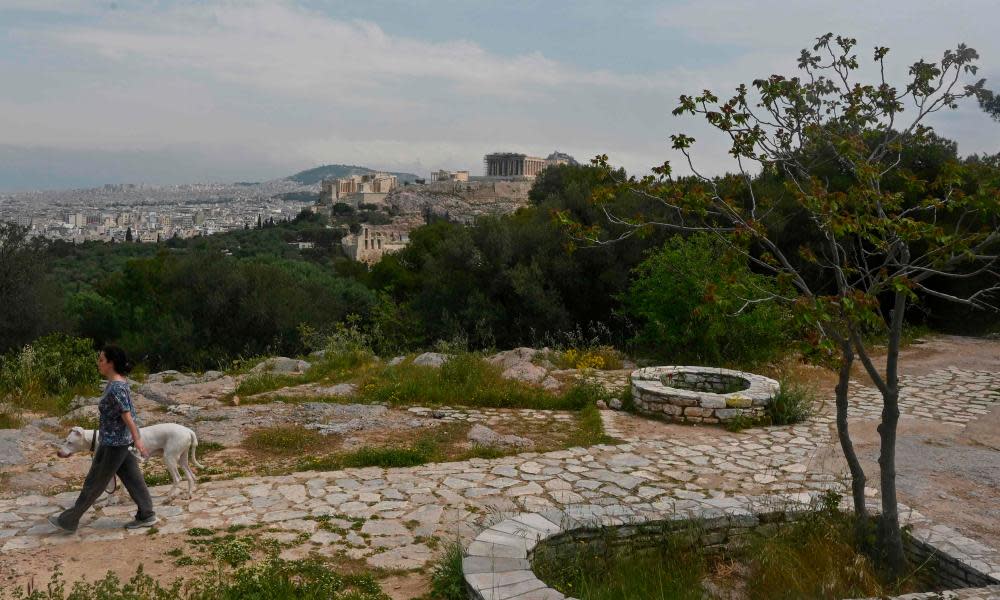Greece preparing new tourism rules with EU in wake of coronavirus

Packed pools, beaches and tour buses, as well as middle seats on planes, hotel minibars and scrums at airport check-ins, may all be a thing of the past as Europe’s tourism industry attempts to reimagine the holiday in the wake of the coronavirus.
Travel will take place only under “specific new rules”, Greece’s tourism minister has said as he prepares to propose ways of salvaging the sector with his EU counterparts in the era of Covid-19 on Monday.
“If we are to think of the possibility of travelling this year it has to be under specific new rules,” says Harry Theoharis, the country’s tourism minister , whose economy is especially dependent on the sector. “We have to have new rules for hotels, new rules for beaches, new rules for pools, new rules for breakfast buffets, new rules for tour buses.”
How the regulations will work, and what they will look like, in Europe at least, will be the focus of talks between EU tourism ministers tomorrow. Health and safety measures, including Covid-19 immunity certificates, will be high on the agenda. The possibility of passengers being subject to temperature checks and pre-flight blood tests is also likely to be raised.
“I will be pushing for agreement on a common set of [EU] rules,” Theoharis told the Guardian. “We need them if we are to start moving people from one country to another by road, air or sea. Temporary rules that will have to make economic sense. If, for example, you can only fly with 10 people on a plane to be deemed safe then obviously there will be no flight,” he said.
Global tourism has been among the hardest hit industries by the public health emergency, impacting the lives of some 75 million people employed in an industry brought to a near standstill by travel bans and closed borders. In Greece, where tourism accounts for 20% of GDP and provides one in five jobs, the economy is expected to suffer an immense blow – contracting by as much as 10% - just as it was emerging from its worst crisis in recent times.
Theoharis, who assumed the post last July when the centre-right government was catapulted into office, predicts the country could have “less than a third” of the tourists it hosted last year.
In 2019, Greece attracted a record 33 million arrivals, more than three times its total population, and double the number it lured a decade ago. The boom brought in an unprecedented €18.2bn – revenue that played a crucial role in reviving an economy thrown into depression by a near-decade long public debt crisis that cut output by a quarter.
On the back of mass cancellations, the Hellenic chamber of hotels forecasts that 65% of its members could be forced to declare bankruptcy. Christina Tetradis, who runs a resort on the Ionian isle of Zakynthos and is the chamber’s vice-president, says any desire to resurrect tourism is also tempered by concerns over keeping Greece virus-free. Industry figures, she says, are acutely aware of the dangers inherent in removing travel restrictions too fast. “No one wants to blamed for putting staff at risk or endangering lives.”
But, like Theoharis, she is also persuaded that Athens’ handling of the pandemic will reap rewards.
In contrast to other European countries, Greece, which is poised to ease lockdown measures with the prime minister, Kyriakos Mitsotakis, addressing the nation on Monday, applied tough restrictions to contain coronavirus early on.
“When health and security are so important for travellers worldwide, the way the government has managed to keep the numbers down does, I think, give us a competitive edge,” said Tetradis. “It’s going to be complicated especially for bigger hotels. There are so many questions, like how many people can you have in a pool, are buffets out and what if someone falls sick? But there is also a sense of safety regarding coronavirus that we can project too.”
With 2,506 confirmed cases of the disease and a death toll of 130, Greece has to date fared far better on the Covid-19 battlefront than expected.
Turkey to its east and Italy to its west have suffered hugely, by Sunday registering mortality rates of 2,706 and 26,386 respectively.
Reimagining travel will be as paramount to tourism’s survival as the precautions needed to prevent possible infections, say officials. After the 9/11 terror attacks in 2001 the sector took three years to recover but rose dramatically when it rebounded.
Theoharis acknowledges that the future is fraught with uncertainly. Already, fears abound of a second wave of the epidemic later this year and, ultimately, much will depend on the discovery of a vaccine.
Related: Coronavirus: global death toll passes 200,000 as more countries prepare to reopen
But if the warm weather brings a reprieve, as epidemiologists hope, Greece, he says, could open to holidaymakers in July – later than usual but in time for the peak summer months when most revenue is made.
Selective tourism is not ruled out: traditional markets in the UK, Germany and France, may be replaced by tourists from eastern and central Europe used to accessing the country by car if air links continue to be suspended.
“Once measures are relaxed a good month will be required to prepare the ground for the [tourism] engine to get started,” he said. “Tour operators are waiting and hoping we can come up with the right rules so that we can start bringing visitors in. We have to strike the right balance … be cautious, tough it out and make the best of it.”

 Yahoo News
Yahoo News 
